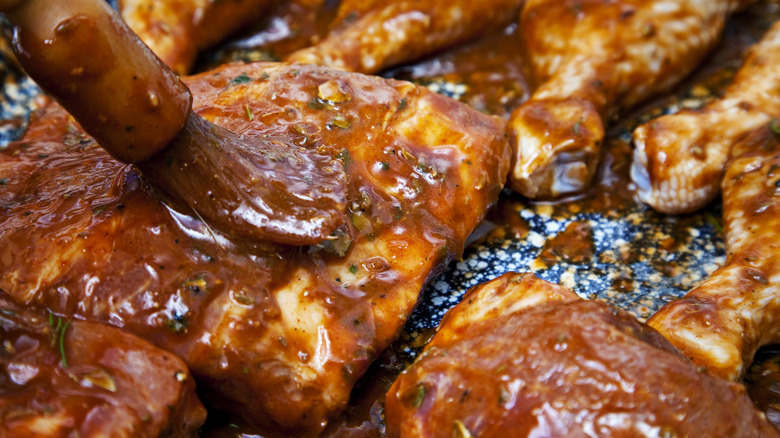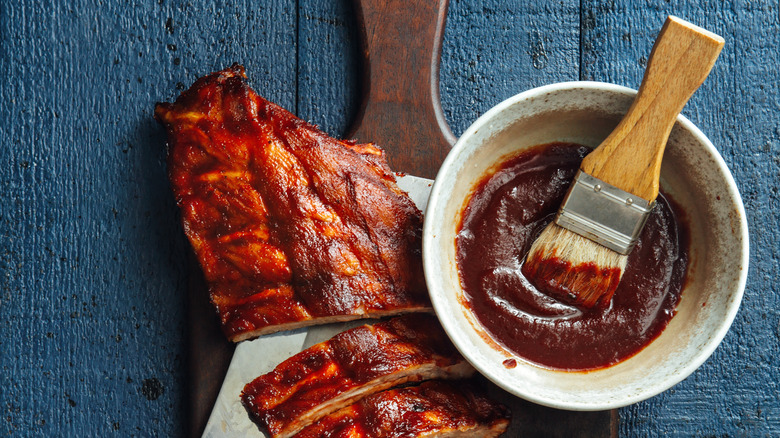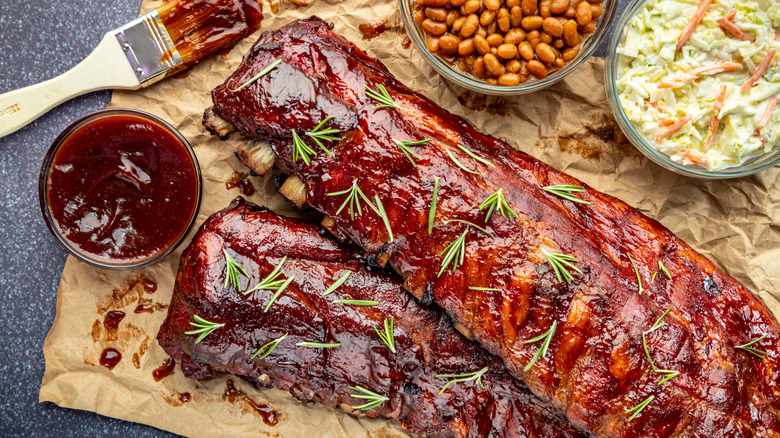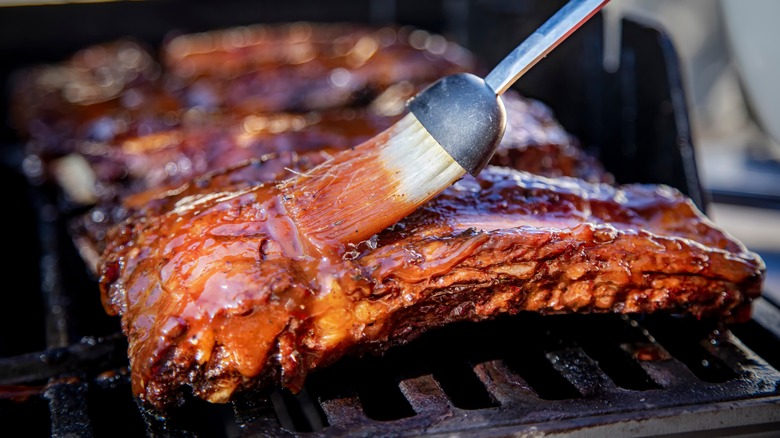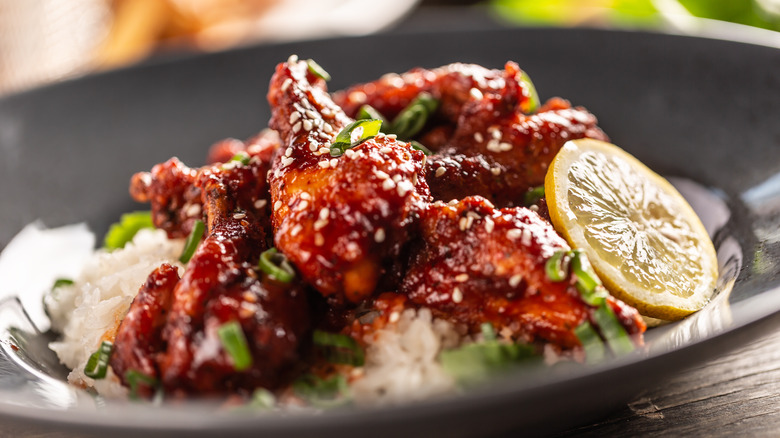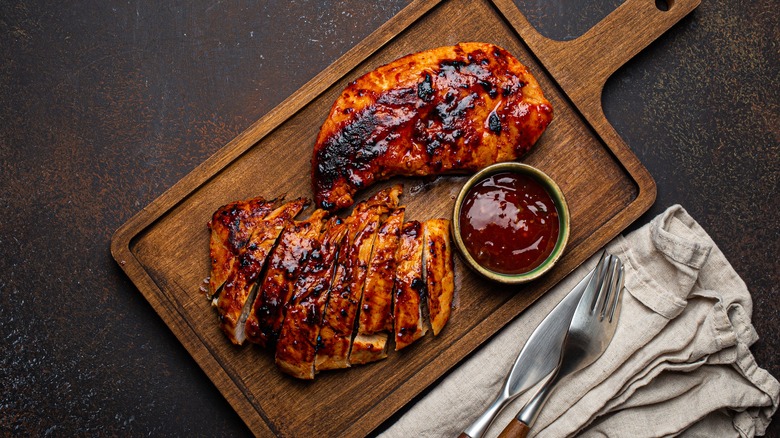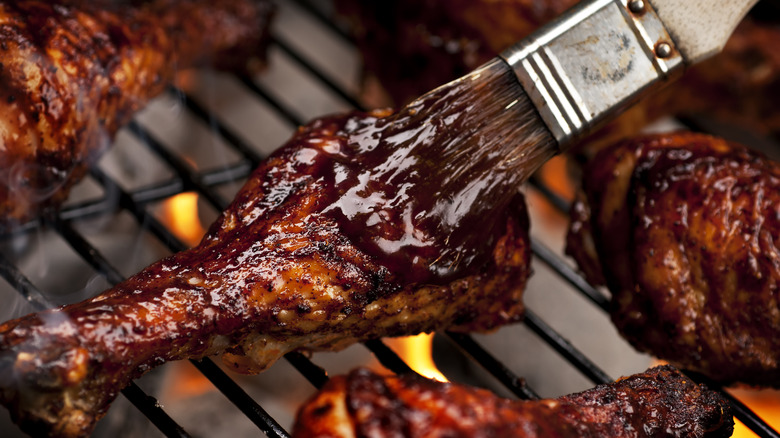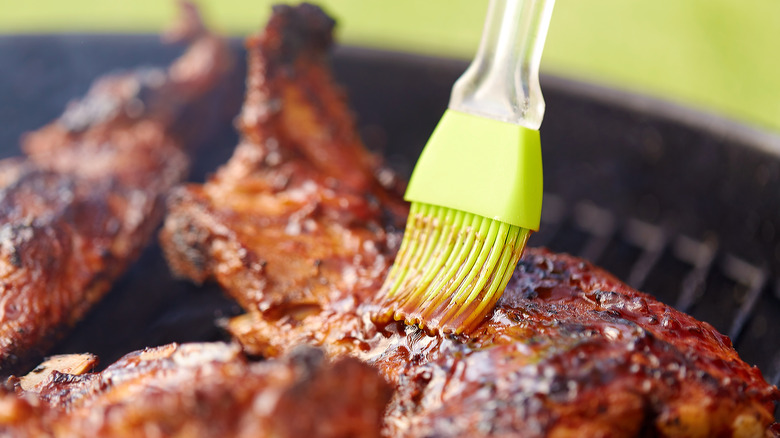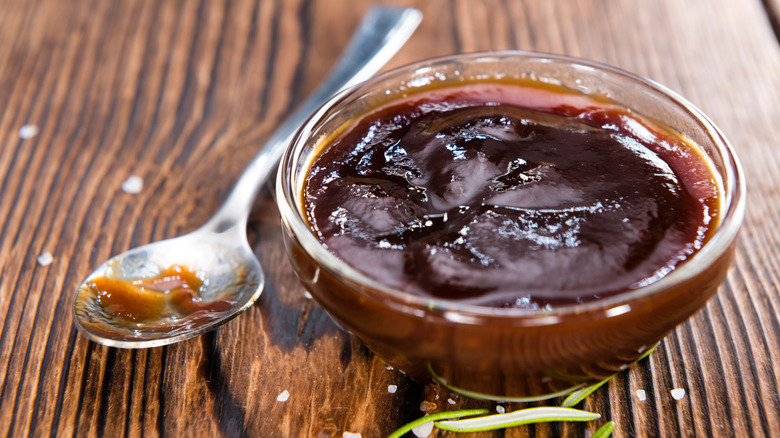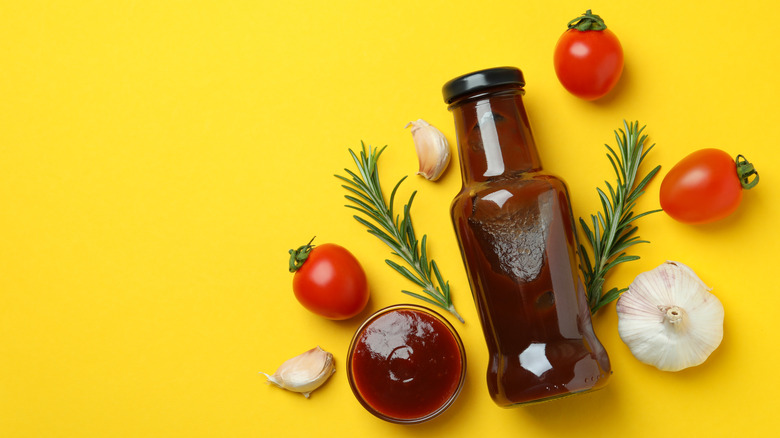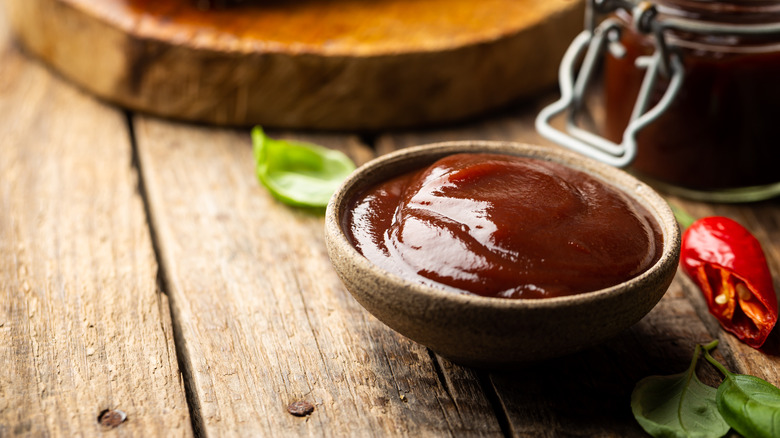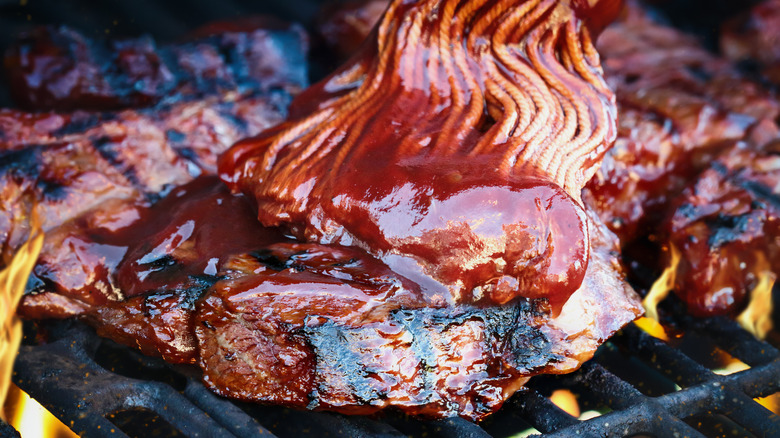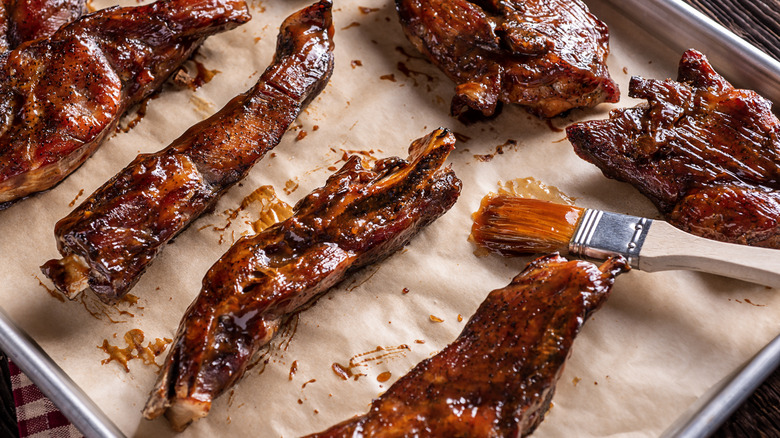13 BBQ Sauce Mistakes People Make
A good plate of barbecue is a labor of love, a combination of well-chosen meat, ideal cooking conditions, and the perfect amount of resting. The thing that ties it all together, though, is the sauce. BBQ sauce has been an essential part of barbecue food culture for hundreds of years, with early citrus-based sauces appearing in historical records in the late 1600s. This source of acidity was replaced by vinegar in 19th-century Southern barbecue, with tomato-based sauces becoming more common in the early 1900s. Nowadays, there are countless recipes for BBQ sauce, with many handed down from person to person, and many others available in bottled form at your local supermarket.
However you like your BBQ sauce, though, how you use it is as important as how it's made — and unfortunately, a lot of mistakes can occur. Using BBQ sauce is not as simple as just slathering it on your food and crossing your fingers. By adding it to meat too early, using the wrong type of sauce, or using the wrong utensils to apply it, you could end up ruining your hard work and disappointing your hungry guests.
1. Mistake: Using the wrong sauce for your meat
Pairing BBQ sauce with meat is more complicated than you might think, and it's crucial to remember that some types simply won't gel with some proteins. BBQ sauces tend to be identified by their base ingredient, with tomato and vinegar being two of the most common starting points, and mustard and mayonnaise-based sauces also fairly prevalent. As you might expect, vinegar-based sauces are especially acidic. While that astringent nature plays well with fatty joints of pork, where it can cut through its richness, it works less well with leaner meats or the natural taste of beef, which tends to pop with sweeter flavors.
This also tends to be the case with mayonnaise-based sauces, such as Alabama's white BBQ sauce. The creaminess of this sauce can pair beautifully with chicken, but less beautifully with red meat, where its density tends to clash with the already rich flavors. On the other hand, tomato-based sauces are usually the most versatile and can be used on both red and white meat alike. If in doubt, it's best to go for a tomato-based sauce, to avoid the chance of your barbecue being ruined at the last minute.
2. Mistake: Marinating meat in BBQ sauce
BBQ sauce is the perfect way to add an immediate pop of flavor at the end of a long cooking process, and its intensity can make it tempting to use earlier on in your recipe, namely as a marinade. However, if you're considering doing that, we'd recommend you hold off. BBQ sauce is less effective as a marinade due to its relative thickness. Although there are thinner BBQ sauces out there, the thicker varieties are usually ineffective at penetrating your meat and will instead just adhere to its surface, preventing the creation of deep flavor.
In addition, marinating your food in BBQ sauce can cause big issues when you cook it. Many BBQ sauces are packed with sugar, which is partly why they provide such big flavor. This sugar, though, can burn quickly, and if you're planning on cooking your marinated meat for several hours, it'll end up charred and bitter. Aside from all this, marinating your food in BBQ sauce is a very expensive way to add flavor. You can make a far cheaper, and more effective, marinade using a few cheap ingredients like lemon juice or vinegar, some oil, and any spices or herbs that you have at hand.
3. Mistake: Using too much BBQ sauce when you're grilling food
Some people love their barbecue sauce, folks. If you're one such person, we're not here to judge — we love it too — but we implore you to think about how much you're adding. Way too many folks add a huge amount of BBQ sauce onto their food at the end of the grilling or smoking process, and it becomes the predominant element in their meal. As a result, all of those delicate, complex flavors you've developed in your food become completely dominated by sweetness and acidity.
It's worth remembering that you often need way less sauce than you think. For a whole barbecued chicken, for example, ½ cup of sauce will suffice, whereas pork chops need just ¼ cup. You should always focus less on adding more sauce, and more on making sure you're achieving good coverage on your meat. Having said this, you should also remember that adding too little sauce has its drawbacks. The sauce works as a flavor booster for your meat, but adding too little will leave your food dry and stop your meal from really shining.
4. Mistake: Forgetting about the different styles of BBQ sauce
We're all creatures of habit, and when you find a BBQ sauce that you like, it's easy to end up sticking to that brand forever. Failing to remember the world of choice out there, however, will leave your palate wanting. There are countless options for BBQ sauces, all of which have different balances of acidity, spice, and sweetness, and trying all of them may help you determine the style of barbecue you're most fond of.
BBQ sauce styles are often determined by geographical location and correspond to a state or city's trademark flavors. Memphis-style BBQ sauces, for example, are often molasses-based, which brings a deep, mellow sweetness to the table. Tennessee- and Kentucky-style sauces, meanwhile, can often contain whiskey or bourbon, providing a woody, smoky intensity.
Crucially, BBQ sauces are not just made in the U.S., and looking further afield can help you discover brand-new flavors for your meals. Korean BBQ sauce is quite different from American sauce and is made with gochujang, honey, rice wine vinegar, and sesame oil. It delivers heat, intense sweetness, and nuttiness that pairs wonderfully with pork and chicken. Korean BBQ sauce also makes for a great burger glaze.
5. Mistake: Using a runny sauce on your barbecued food
Although BBQ sauce is typically thick and unctuous, it isn't always made that way. Some barbecue sauces can be noticeably thinner and sometimes pretty runny. This can make cooking with it pretty tricky. When your sauce is too runny, it tends not to stick to your meat properly, making adequate coverage quite difficult. Runny sauce can often end up dripping away from your meat onto your grill's heat source, which can contribute to flare-ups.
As well as this, runny sauce can often soak too much into other food items, like bread or buns, making them overly moist. You may also find that runny sauces taste less concentrated, and have a slightly diluted flavor, compared to their thick counterparts. Luckily, help is at hand if your sauce is too runny. To quickly thicken it, empty it into a pan and boil it for a few minutes, simultaneously evaporating its excess moisture and intensifying its flavor. You can also mix in a thickening agent like flour or cornstarch, making sure to cook it slightly to activate its bulking qualities.
6. Mistake: Adding your sauce to meat too early
Adding your BBQ sauce to your meat is probably the most fun part of the cooking experience — and as it's also usually an indication that it's almost time to eat, it's tempting to jump the gun and get it on there at the earliest opportunity. Do this, though, and you may destroy your meal. Most barbecue sauces contain high amounts of sugar, and when you add them to your meat too early, this sugar will burn. This will both kill the taste of your food and cause you to have a complicated, annoying cleanup job after, as you scrape burnt sugar from your grill.
Therefore, you should wait until your meat is almost done before adding your sauce. Daubing it on anywhere from five to 10 minutes before you pull your meat off the grill is best. The idea is that you allow your sauce to warm up and gently cook, activating its flavors without overdeveloping them while also adding some much-needed moisture to your meat. Make sure you don't add it too late, though, as your sauce will remain cold on your meat's surface, making everything quite unappetizing.
7. Mistake: Using the wrong utensils to apply BBQ sauce
How are you adding your BBQ sauce to your food? By using a spoon? A wad of kitchen towel, perhaps? If either of these is your chosen utensil, you're doing things wrong. When applying barbecue sauce, you'll want to make sure you get into every corner of your meat, to maximize its flavor. If you're just pouring it on or smearing it on haphazardly, you'll end up producing uneven food.
Alongside your other essential outdoor grilling tools, a good-quality basting brush to apply BBQ sauce should be part of your arsenal. Make sure you get a heat-resistant model, with bristles that are attached firmly to the handle, so you don't leave any stray ones on your food. Silicone basting brushes are perfect for this purpose, and they're also usually dishwasher-safe, making cleanup a breeze. You should also try and make sure that your bristles are firm enough to properly brush the sauce across the meat while remaining soft enough to be pliable. It can also be a good idea to get a model with a longer handle, so you don't end up burning yourself while applying sauce if you're leaving your meat on the grill while doing so.
8. Mistake: Using expired BBQ sauce
We tend not to check the use-by date of our condiments as much as other food, potentially because items like ketchup, mustard, and BBQ sauce are shelf-stable and often have high amounts of preserving ingredients like salt, sugar, and acids. Unfortunately, though, that bottle of BBQ sauce won't last forever. It can go bad quicker than you think, too: If you're leaving it in the pantry, you may only have a month before it starts to spoil.
Popping your BBQ sauce in the fridge can extend its life span considerably and give you up to nine months before you need to throw it out. Unfortunately, buying high-quality BBQ sauce will likely cause it to deteriorate even faster. Because these sauces are often made with just natural ingredients and no added preservatives, they spoil quicker, giving you only around four months to use them up.
If your sauce has been lurking in the back of your cupboard for a long time, make sure to smell it before use. If it has an off-putting, funky scent that's noticeably different from when you bought it, you shouldn't apply it to your food. A color change can also flag that your sauce needs to be put in the trash.
9. Mistake: Only using it for your meat
BBQ sauce and meat are a match made in heaven. Too many people, however, forget that this delectable dressing can be applied to far more than your brisket and chops. BBQ sauce can add immediate smokiness, tang, and sweetness to any food you care to name, and in many situations, it will give dishes a different flavor dimension. A shake or two of BBQ sauce into a casserole or stew, for instance, will give it additional depth and help to round out the flavors of your meat and vegetables. It'll do a pretty good job of adding extra thickness, too.
You also don't have to add BBQ sauce to anything to enjoy it; you can simply eat it on its own. Try serving your sauce as a dip, shaking it out into a serving dish and scooping it up with some tortilla chips. BBQ sauce's inherently sugary flavors also mean that it can be used in some pretty surprising ways. If you're a fan of homemade meat pies, using BBQ sauce inside them will add a sweetness to your filling that prevents them from becoming too heavy and savory. We'd probably advise keeping it out of your dessert pies, though.
10. Mistake: Using a poor-quality bottled BBQ sauce
Sometimes, our purchases don't turn out the way we want them to — and while many barbecue sauce connoisseurs have their favorite brand, sometimes risks are taken on new products, with disastrous results. The problem with BBQ sauce is that there are so many different kinds out there, and it's virtually impossible to check their quality before you take them home (unless you crack open the bottle right there in the store, which we don't recommend doing). Barbecue sauce companies tend to push their flavors way too far in one direction to try and make them distinctive — but this means that many products end up too sweet, salty, or acidic.
Using these unbalanced products in your meals can make your food pretty unappetizing. The good news is that bottled BBQ sauces can be quickly improved with the addition of readily available ingredients. If your store-bought BBQ sauce is too sweet, try adding some extra acid, like rice wine vinegar or lemon juice. As you might expect, sauces that are too acidic can be put right with some extra sugar. You needn't go overboard with your additions — you don't want to end up making an entirely new sauce — but a simple tweak here and there can save your meal.
11. Mistake: Forgetting to serve your sauce on the side
The joy of BBQ sauce is that it is (drumroll please) a sauce: not a rub or a marinade but a thick, velvety liquid that delivers huge flavor. However, that saucy aspect can sometimes be lost when you apply it to meat, and as it caramelizes and firms up on your food, it can occasionally end up drier than you thought it would.
Now, this isn't a huge problem in itself, as you probably don't want your meat to be dripping with sauce and unwieldy, but it can leave some people wanting a little more moisture. That's why you should always serve BBQ sauce on the side. Pour the leftover bottled sauce into some serving dishes and dot them around your table, or simply plonk the bottle down and let everyone do their thing. By doing this, you allow your guests to control the amount of BBQ sauce they have on their food. Sauce-heads are free to douse their brisket or chicken in extra moisture, while the folks who prefer their food to be less saucy can enjoy the meat just as you made it.
12. Mistake: Confusing a mop sauce for a regular BBQ sauce
BBQ sauces come in many formulations and flavors, and their consistency can vary pretty considerably too. If you find that your BBQ sauce is especially thin, you may not have picked up a standard variety — it may be a mop sauce instead. Mop sauces are a distinctive strand of BBQ sauces that are applied to the meat during the cooking process, instead of at the end. A thin, flavored liquid, the mop sauce gets its name for how it's slathered onto whatever you're cooking: quite literally mopped onto it, using a barbecue basting mop or thin-bristled brush.
The idea with a mop sauce is to add it at periodic intervals, with layers of flavor being built up on your meat over several hours. As these sauces are often vinegar-based and laden with sugar and seasonings, they fit into the flavor profile of regular BBQ sauce well, and they have the added effect of keeping your food moist as it sizzles away. Because these sauces are so thin, however, they're not that useful for serving on the side of your meat or flavoring other food items and should only be used for their specific purpose.
13. Mistake: Not considering cross-contamination when cooking with BBQ sauce
Cross-contamination is something you should think about when you're cooking anything, but it's particularly important to consider with BBQ sauce. If you're applying this sauce to your meat during the cooking process, there's every possibility that you may come into contact with undercooked parts of the protein that could be carrying bacteria. These bacteria may then end up back in your barbecue sauce, or spreading from your brush to your food service area.
If it gets into your main supply of BBQ sauce, this can be especially problematic if you're planning on serving some of it on the side of your food. To prevent any potential infection, it's best to separate things beforehand. Put the BBQ sauce you're applying to your meat in a separate bowl before you start cooking, and keep it in a designated area, away from the rest of your food and utensils. Make sure the brush you're using doesn't come into contact with anything else, and always wash your hands thoroughly between handling your meat and any other food.
